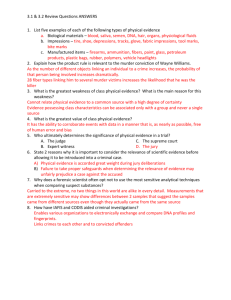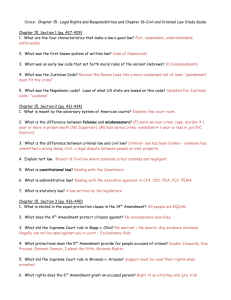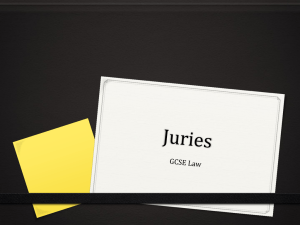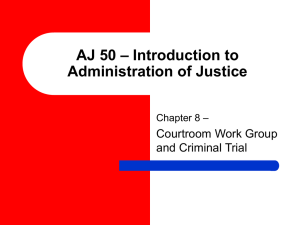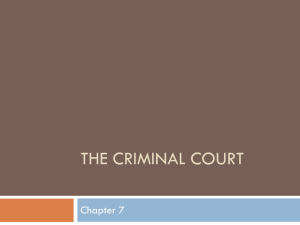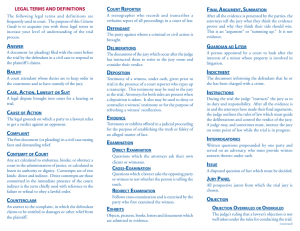Mock Trial Vocabulary
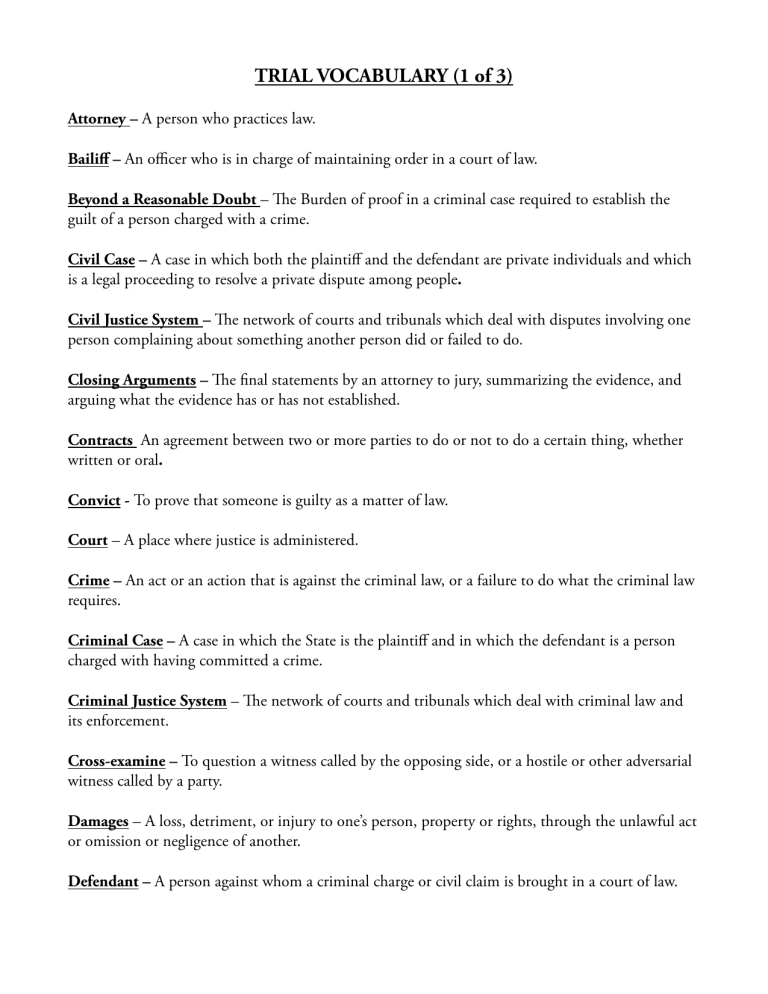
TRIAL VOCABULARY (1 of 3)
!
!
Attorney – A person who practices law.
!
Baili ff – An o ffi cer who is in charge of maintaining order in a court of law.
Beyond a Reasonable Doubt – Th e Burden of proof in a criminal case required to establish the
!
guilt of a person charged with a crime.
Civil Case – A case in which both the plainti ff and the defendant are private individuals and which
!
is a legal proceeding to resolve a private dispute among people .
Civil Justice System – Th e network of courts and tribunals which deal with disputes involving one
!
person complaining about something another person did or failed to do.
Closing Arguments – Th e fi nal statements by an attorney to jury, summarizing the evidence, and
!
arguing what the evidence has or has not established.
Contracts An agreement between two or more parties to do or not to do a certain thing, whether
!
written or oral .
!
Convict - To prove that someone is guilty as a matter of law.
!
Court – A place where justice is administered.
Crime – An act or an action that is against the criminal law, or a failure to do what the criminal law
!
requires.
Criminal Case – A case in which the State is the plainti ff and in which the defendant is a person
!
charged with having committed a crime.
Criminal Justice System – Th e network of courts and tribunals which deal with criminal law and
!
its enforcement.
Cross-examine – To question a witness called by the opposing side, or a hostile or other adversarial
!
witness called by a party.
Damages – A loss, detriment, or injury to one’s person, property or rights, through the unlawful act
!
or omission or negligence of another.
!
Defendant – A person against whom a criminal charge or civil claim is brought in a court of law.
TRIAL VOCABULARY (2 of 3)
!
Deliberations – Th e act of jurors talking to each other and coming to a decision on the charges or
!
crimes of a trial.
!
Evidence – Something that gives proof of a contested fact.
!
Foreman/Foreperson – Th e presiding member of a jury who speaks or answers for the jury.
!
Guilty– Having been convicted by a jury of having done something wrong.
Indictment – A serious charge of criminal wrongdoing which must later be proved at trial beyond a
!
reasonable doubt before a defendant may be convicted.
!
Injunction – A court order prohibiting a party from a speci fi c course of action.
!
Innocent – Not guilty of a crime or fault.
Instructions On Th e Law – A direction given by the judge to the jury concerning the law of the
!
case, usually at the end of the case and just before jury deliberations.
!
Irrelevant – Not important, pertinent to the matter at hand or to any issue before the court.
!
Judge – An o ffi cial who can conduct hearings and decide on cases in a court of law.
Jury - A certain number of persons selected according to law and sworn in to inquire into matters of
!
fact and declare the truth about matters of fact before them.
!
Law – A rule made by a country, state, or town for the people there.
Negligence – Acting in a way that fails to conform with a speci fi c standard of conduct, thereby
!
putting others at risk for injury.
Negligent Homicide – A criminal o ff ense that is committed by a person whose negligence is the
!
direct cause of another person’s death.
Objection – A lawyer’s protest about the legal propriety of a question which has been asked of a witness by the opposing attorney, with the purpose of making the trial judge decide if the question
!
!
can be asked.
!
TRIAL VOCABULARY (3 of 3)
Opening Statement – Summary of nature of case and of anticipated proof presented by counsel to
!
jury at the start of a trial.
Overruled – In trial practice, for a Judge to disagree that an attorney’s objection, as to a question, is
!
valid.
Plainti ff – Th e person who brings a civil law suit, or in the case of a criminal case, the State or
!
Federal government.
Preponderance of the evidence – Th e greater weight of the evidence: superior evidentiary weight that, though not su ffi cient to free the mind wholly from all reasonable doubt, is still su ffi cient to incline a fair and impartial mind to one side of the issue rather than the other. (Burden of Proof in a
!
civil trial)
Prosecuting Attorney – Th e name of the public o ffi cer who is appointed or elected in each judicial
!
district, circuit, or county, to conduct criminal prosecutions on behalf of the State or people.
!
Reporter – Someone in charge of making a record of all court proceedings.
!
Rests – Th e attorneys representing either side of the case are fi nished with their witnesses.
Rebuttal – Evidence introduced to counter, disprove or contradict the opposition’s evidence or a
!
presumption, or responsive legal argument.
!
Speculation – Just guessing about a particular situation.
!
Sustain – In trial practice, for a judge to agree that an attorney’s objection, as to a question, is valid.
!
Testify – To give evidence under oath.
!
Trial – Th e examination and deciding of a case brought before a court of law.
!
Verdict - Th e decision made by a jury at the end of the trial.
Verdict Form – A form given to the Jury Foreperson on which to write the decision that is made by
!
the jury at the closing of a trial.
Voir Dire – Meaning “To speak the truth,” it is the name given to that part of the trial when the
!
court and parties attempt to seat a fair and impartial jury.
Witness – Someone who is called to testify before a court of law.

